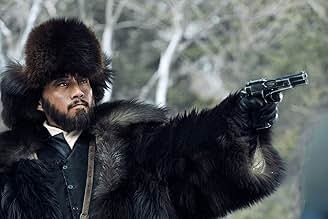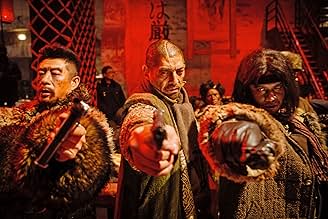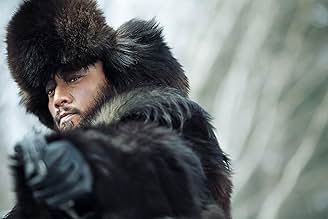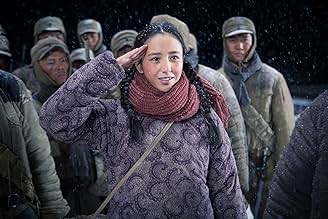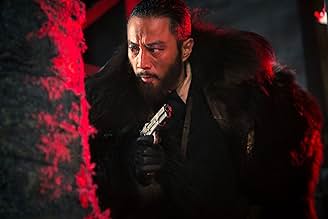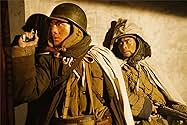IMDb रेटिंग
6.4/10
3.5 हज़ार
आपकी रेटिंग
अपनी भाषा में प्लॉट जोड़ेंA story focusing on a conflict between a People's Liberation Army squad and a bandit gang in north-east China during the Chinese revolution.A story focusing on a conflict between a People's Liberation Army squad and a bandit gang in north-east China during the Chinese revolution.A story focusing on a conflict between a People's Liberation Army squad and a bandit gang in north-east China during the Chinese revolution.
- पुरस्कार
- 21 जीत और कुल 41 नामांकन
फ़ीचर्ड समीक्षाएं
Every December, in the China mainland, is the protective month for Chinese productions in local multiplexes, practically all the foreign tent-poles are pushed back and it is also the most profitable period for this vastly booming market. This year, the two main contenders are GONE WITH THE BULLETS (2014), Wen Jiang's much-hyped follow-up to the massively successful LET THE BULLETS FLY (2010, 8/10) and this Hark Tsui's latest offer of a 3D spectacle retelling a legendary battle during the period of Chinese Civil war. Nevertheless the former receives some unexpected backlash from critics and audience, which prompts me to pick the latter, plus I am bringing my parents, who will feel more related to the story since they know the original tale very well.
Much exceeding my expectation, this is by far the most amazing 3D Chinese film I have ever watched in the theater, breathtakingly sets out the vast North East snowfield where the story unfolds, without compromising the luminance of the screen. Despite that the film starts with a modern-day prologue in New York, which inconveniently enforces a weird sense of incongruity with the main event, the first impression is pretty awesome, however, this subplot will continue to distract viewers out of the picture every so often and largely banks on heart-throb Gen Han's presence.
The story takes place in 1947, a Communist detachment named 203 lead by Jianbo (Kenny Lin) fights against the bandit chieftain Cinereous Vulture (Leung), who takes over the Tiger Mountain with his eight warriors and thousands of bandits, plus heavy arms left by Japanese after the Anti-Japanese War (1937-1945), including artilleries, cannons and a tank. Hogging the vantage point, they constantly attacks the villages nearby and becomes a major threat in the turf. Whereas the detachment has only 30 soldiers altogether with much lighter weaponry. There is only one way to win this battle against heavy odds, to circumvent the head-on confrontation and outwit the enemy by an audacious sneak attack.
So Zirong Yang (Hanyu Zhang), a singular soldier, proposes an undercover scheme, he volunteers to infiltrate into the gang and look for a weak link in their defense system, so they can capture them all at one swoop. The mission is an adventurous one full of pitfalls and any small slip will cost Yang's life, Hanyu Zhang embodies this lone hero bravura with enthralling excitement and poise, confidently delivers bandit's cant and liberates his masculine charisma as a military man. Hong Kong veteran Tony Ka Fai Leung, almost unrecognizable here as the villain, easily stands out with his flashy and distinctive outfits, so is his eight warriors, all have been upgraded with eye-popping apparel and apparatuses. By contrast, the Communist soldiers are far more plain and conventional. Kenny Lin outstrips his youthful greenness, strenuously leaves an impression of being mature and serious. With six screenwriters credited, they enrich the film with adequate suspense, sporadic humor, the routine sacrifice and female presence (e.g. Nan Yu owns her dramatic outburst in a crudely sketched characterization).
Hark Tsui has ventured into 3D technology since two DETECTIVE DEE films and the dismaying FLYING SWORDS OF DRAGON GATE (2011, 3/10), so finally he reaches the benchmark with this one, along with the dashing bullets and grenades slo-motion, he also schemes a prolonged alternative ending after the credits, just to show that now the industrial special effects craftsmanship is no interior compared with the Hollywood criterion. One can grudge about the final coup de main is way too easy to accomplish, but for anyone who is familiar with the current status of Chinese cinema, it is a good relief we can dish up such an entertaining blockbuster independently, and its box-office prospect is quite promising too, a sure-fire to reach a career-high for the maestro Hark after 35 years in the line.
Much exceeding my expectation, this is by far the most amazing 3D Chinese film I have ever watched in the theater, breathtakingly sets out the vast North East snowfield where the story unfolds, without compromising the luminance of the screen. Despite that the film starts with a modern-day prologue in New York, which inconveniently enforces a weird sense of incongruity with the main event, the first impression is pretty awesome, however, this subplot will continue to distract viewers out of the picture every so often and largely banks on heart-throb Gen Han's presence.
The story takes place in 1947, a Communist detachment named 203 lead by Jianbo (Kenny Lin) fights against the bandit chieftain Cinereous Vulture (Leung), who takes over the Tiger Mountain with his eight warriors and thousands of bandits, plus heavy arms left by Japanese after the Anti-Japanese War (1937-1945), including artilleries, cannons and a tank. Hogging the vantage point, they constantly attacks the villages nearby and becomes a major threat in the turf. Whereas the detachment has only 30 soldiers altogether with much lighter weaponry. There is only one way to win this battle against heavy odds, to circumvent the head-on confrontation and outwit the enemy by an audacious sneak attack.
So Zirong Yang (Hanyu Zhang), a singular soldier, proposes an undercover scheme, he volunteers to infiltrate into the gang and look for a weak link in their defense system, so they can capture them all at one swoop. The mission is an adventurous one full of pitfalls and any small slip will cost Yang's life, Hanyu Zhang embodies this lone hero bravura with enthralling excitement and poise, confidently delivers bandit's cant and liberates his masculine charisma as a military man. Hong Kong veteran Tony Ka Fai Leung, almost unrecognizable here as the villain, easily stands out with his flashy and distinctive outfits, so is his eight warriors, all have been upgraded with eye-popping apparel and apparatuses. By contrast, the Communist soldiers are far more plain and conventional. Kenny Lin outstrips his youthful greenness, strenuously leaves an impression of being mature and serious. With six screenwriters credited, they enrich the film with adequate suspense, sporadic humor, the routine sacrifice and female presence (e.g. Nan Yu owns her dramatic outburst in a crudely sketched characterization).
Hark Tsui has ventured into 3D technology since two DETECTIVE DEE films and the dismaying FLYING SWORDS OF DRAGON GATE (2011, 3/10), so finally he reaches the benchmark with this one, along with the dashing bullets and grenades slo-motion, he also schemes a prolonged alternative ending after the credits, just to show that now the industrial special effects craftsmanship is no interior compared with the Hollywood criterion. One can grudge about the final coup de main is way too easy to accomplish, but for anyone who is familiar with the current status of Chinese cinema, it is a good relief we can dish up such an entertaining blockbuster independently, and its box-office prospect is quite promising too, a sure-fire to reach a career-high for the maestro Hark after 35 years in the line.
Tsui Hark movies are always a mixed bag for me. The Vietnamese New Wave director created visually stunning, profoundly philosophical and mostly historically inspired movies like the ''A Chinese Ghost Story'' and ''Once Upon a Time in China'' movie series in his early years that any movie fan should know. In recent years, he rather focused on commercially entertaining, effect-ridden and overall meaningless films such as ''Detective Dee and the Mystery of the Phantom Flame'' and ''The Flying Swords of Dragon Gate''. The latter movies weren't entirely bad but they weren't on the same artistic, authentic and intellectual level as his early classics. ''The Taking of Tiger Mountain'' is situated somewhere in between both categories but probably closer to the second group than to the first.
On the positive side, the movie is partially historically inspired even though the film isn't devoid of a certain propagandistic approach that presents the People's Liberation Army in a much too positive way. The movie basically tells the story of a small group within this army that needs to outsmart a large group of bandits that are raiding villages in the northern parts of the fragile country. The settings of the movie are truly spectacular. The costumes, the villages and even the way the actors speak are truly accurate and trace your way back seventy years in time. Most of the story is set in elegant winter landscapes and one gets to see breathtaking valleys and mountains, simple but charming skiing exercises and even a couple of animals such as the tiger that attacks the protagonist halfway through the movie. In comparison with Tsui Hark's other recent movies, especially the first half of the film feels refreshingly authentic, natural and realistic and only a few effects are used in an efficient way. Towards the climax of the story, more and more special effects are used but they somehow add to the action and tension of the film and don't feel randomly inserted as in many of his other recent films. The action choreographies are stunning and the best example for these intense passages is the battle in the raided village which takes place towards the last third of the movie. While the acting itself is not outstanding, it definitely has more depth than characters in Tsui Hark's more recent films and one can feel some empathy with the smart and mysterious protagonist, the emotional and lonely child or the optimistic female combat medic.
On the negative side, the main villain remains superficial and even ridiculous at certain moments. The short moments of humour when he speaks nonsense or exaggeration when he gestures in theatrical manner feel out of place and unnecessarily decrease the intensity of the movie. The special effects get a little bit exaggerated in the final twenty minutes or so of the movie and contrast the initially authentic magic of the movie that turns into something which isn't a far call from a meaningless Hollywood action flick. The story itself is also a little bit too simple, predictable and one-sided. Another element which I disliked is how the movie was forcedly connected to some random Chinese emigrant living in New York City who can't let go of his culture, family and past instead of trying to become accurately integrated in a foreign country. I feel that this connection to our contemporary world didn't add anything at all to the movie even if the director probably intended to prove that the value of this story based on Qu Bo's novel of the same name from 1957 has been firmly planted in the Chinese national consciousness for more than half a century.
In the end, the numerous positive elements are much more impressive and present than the few negative facts which can be seen as secondary. Tsui Hark somewhat redeems himself after a series of rather shallow flicks that were only aiming for commercial success, modern special effects and simple entertainment. This movie has more depth concerning the characters, magic settings and at least some kind of moral at certain points in the story. This movie still isn't on the same level as Tsui Hark's earliest successes but fans of historically inspired contemporary Chinese action movies can't go wrong with this movie and should therefore give this film a chance.
On the positive side, the movie is partially historically inspired even though the film isn't devoid of a certain propagandistic approach that presents the People's Liberation Army in a much too positive way. The movie basically tells the story of a small group within this army that needs to outsmart a large group of bandits that are raiding villages in the northern parts of the fragile country. The settings of the movie are truly spectacular. The costumes, the villages and even the way the actors speak are truly accurate and trace your way back seventy years in time. Most of the story is set in elegant winter landscapes and one gets to see breathtaking valleys and mountains, simple but charming skiing exercises and even a couple of animals such as the tiger that attacks the protagonist halfway through the movie. In comparison with Tsui Hark's other recent movies, especially the first half of the film feels refreshingly authentic, natural and realistic and only a few effects are used in an efficient way. Towards the climax of the story, more and more special effects are used but they somehow add to the action and tension of the film and don't feel randomly inserted as in many of his other recent films. The action choreographies are stunning and the best example for these intense passages is the battle in the raided village which takes place towards the last third of the movie. While the acting itself is not outstanding, it definitely has more depth than characters in Tsui Hark's more recent films and one can feel some empathy with the smart and mysterious protagonist, the emotional and lonely child or the optimistic female combat medic.
On the negative side, the main villain remains superficial and even ridiculous at certain moments. The short moments of humour when he speaks nonsense or exaggeration when he gestures in theatrical manner feel out of place and unnecessarily decrease the intensity of the movie. The special effects get a little bit exaggerated in the final twenty minutes or so of the movie and contrast the initially authentic magic of the movie that turns into something which isn't a far call from a meaningless Hollywood action flick. The story itself is also a little bit too simple, predictable and one-sided. Another element which I disliked is how the movie was forcedly connected to some random Chinese emigrant living in New York City who can't let go of his culture, family and past instead of trying to become accurately integrated in a foreign country. I feel that this connection to our contemporary world didn't add anything at all to the movie even if the director probably intended to prove that the value of this story based on Qu Bo's novel of the same name from 1957 has been firmly planted in the Chinese national consciousness for more than half a century.
In the end, the numerous positive elements are much more impressive and present than the few negative facts which can be seen as secondary. Tsui Hark somewhat redeems himself after a series of rather shallow flicks that were only aiming for commercial success, modern special effects and simple entertainment. This movie has more depth concerning the characters, magic settings and at least some kind of moral at certain points in the story. This movie still isn't on the same level as Tsui Hark's earliest successes but fans of historically inspired contemporary Chinese action movies can't go wrong with this movie and should therefore give this film a chance.
A rollicking, ridiculous action movie. Heroic, crazed and great fun. Not to be taken seriously in any way. The second ending is way more fun. Stay the distance. A Tiger's tail/tale.
Very interesting action adventure with some impressive camera work. The action sequences are amazing and the film is totally unpredictable. The tiger scene was incredible! I loved the film, effects, story and music. Very well done.
I am not a fan of these oriental action films, it is hard to like an action film, when the script is not very interesting, it complicates a little more, totally discouraging ... Unfortunately, I didn't win ...
क्या आपको पता है
- ट्रिवियाThe Tiger is a Siberian Tiger. The largest of the cats.
- कनेक्शनRemake of Lin hai xue yuan (1960)
टॉप पसंद
रेटिंग देने के लिए साइन-इन करें और वैयक्तिकृत सुझावों के लिए वॉचलिस्ट करें
- How long is The Taking of Tiger Mountain?Alexa द्वारा संचालित
विवरण
- रिलीज़ की तारीख़
- कंट्री ऑफ़ ओरिजिन
- भाषाएं
- इस रूप में भी जाना जाता है
- Tiger Mountain Ke Mahabali
- उत्पादन कंपनियां
- IMDbPro पर और कंपनी क्रेडिट देखें
बॉक्स ऑफ़िस
- US और कनाडा में सकल
- $2,28,984
- US और कनाडा में पहले सप्ताह में कुल कमाई
- $50,621
- 4 जन॰ 2015
- दुनिया भर में सकल
- $14,16,54,055
- चलने की अवधि2 घंटे 21 मिनट
- रंग
- ध्वनि मिश्रण
- पक्ष अनुपात
- 1.85 : 1
इस पेज में योगदान दें
किसी बदलाव का सुझाव दें या अनुपलब्ध कॉन्टेंट जोड़ें




